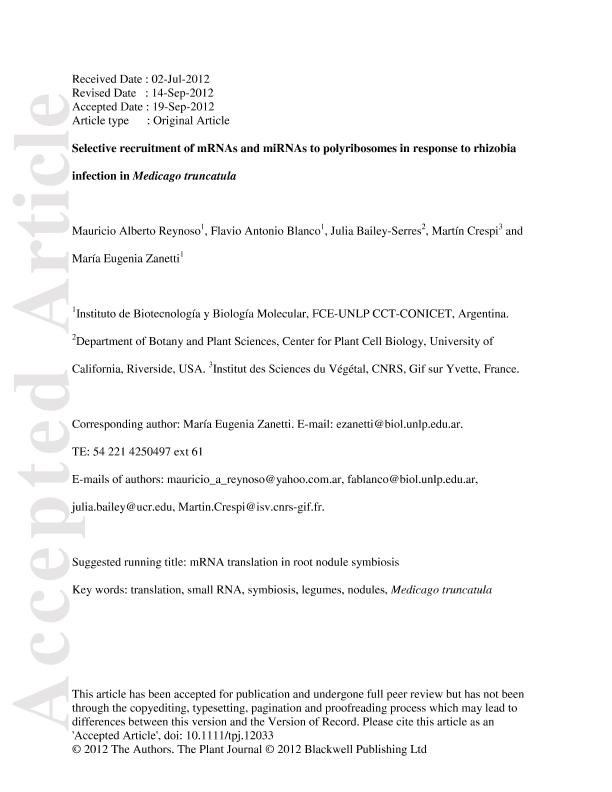Artículo
Selective recruitment of mRNAs and miRNAs to polyribosomes in response to rhizobia infection in Medicago truncatula
Reynoso, Mauricio Alberto ; Blanco, Flavio Antonio
; Blanco, Flavio Antonio ; Bailey Serres, Julia; Crespi, Martin; Zanetti, María Eugenia
; Bailey Serres, Julia; Crespi, Martin; Zanetti, María Eugenia
 ; Blanco, Flavio Antonio
; Blanco, Flavio Antonio ; Bailey Serres, Julia; Crespi, Martin; Zanetti, María Eugenia
; Bailey Serres, Julia; Crespi, Martin; Zanetti, María Eugenia
Fecha de publicación:
10/01/2013
Editorial:
Wiley Blackwell Publishing, Inc
Revista:
Plant Journal
ISSN:
0960-7412
Idioma:
Inglés
Tipo de recurso:
Artículo publicado
Clasificación temática:
Resumen
Translation of mRNAs is a key regulatory step that contributes to the coordination and modulation of eukaryotic gene expression during development or adaptation to the environment. mRNA stability or translatability can be regulated by the action of small regulatory RNAs (sRNAs), which control diverse biological processes. Under low nitrogen conditions, leguminous plants associate with soil bacteria and develop a new organ specialized in nitrogen fixation: the nodule. To gain insight into the translational regulation of mRNAs during nodule formation, the association of mRNAs and sRNAs to polysomes was characterized in roots of the model legume Medicago truncatula during the symbiotic interaction with Sinorhizobium meliloti. Quantitative comparison of steady-state and polysomal mRNAs for 15 genes involved in nodulation identified a group of transcripts with slight or no change in total cellular abundance that were significantly upregulated at the level of association with polysomes in response to rhizobia. This group included mRNAs encoding receptors like kinases required either for nodule organogenesis, bacterial infection or both, and transcripts encoding GRAS and NF-Y transcription factors (TFs). Quantitative analysis of sRNAs in total and polysomal RNA samples revealed that mature microRNAs (miRNAs) were associated with the translational machinery, notably, miR169 and miR172, which target the NF-YA/HAP2 and AP2 TFs, respectively. Upon inoculation, levels of miR169 pronouncedly decreased in polysomal complexes, concomitant with the increased accumulation of the NF-YA/HAP2 protein. These results indicate that both mRNAs and miRNAs are subject to differential recruitment to polysomes, and expose the importance of selective mRNA translation during root nodule symbiosis.
Palabras clave:
Translation
,
Small Rna
,
Symbiosis
,
Legumes
,
Nodules
,
Medicago Truncatula
Archivos asociados
Licencia
Identificadores
Colecciones
Articulos(IBBM)
Articulos de INST.DE BIOTECNOLOGIA Y BIOLOGIA MOLECULAR
Articulos de INST.DE BIOTECNOLOGIA Y BIOLOGIA MOLECULAR
Citación
Reynoso, Mauricio Alberto; Blanco, Flavio Antonio; Bailey Serres, Julia; Crespi, Martin; Zanetti, María Eugenia; Selective recruitment of mRNAs and miRNAs to polyribosomes in response to rhizobia infection in Medicago truncatula; Wiley Blackwell Publishing, Inc; Plant Journal; 73; 2; 10-1-2013; 289-301
Compartir
Altmétricas



